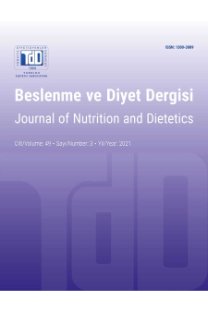Yetişkinlerde Renal Transplantasyon Öncesi ve Sonrasında Tıbbi Beslenme Tedavisi
Medical Nutrition Therapy Before and After Renal Transplantation in Adults
___
- 1. National Kidney Foundation. K/DOQI clinical practice guidelines for chronic kidney disease: evaluation, classification and stratification. Am J Kidney Dis. 2002;39:1-266.
- 2. T.C. Sağlık Bakanlığı ve Türk Nefroloji Derneği Ortak Raporu. Türkiye'de Nefroloji, Diyaliz ve Transplantasyon. Registry 2015. Türk Nefroloji Derneği Yayınları. Ankara: Miki Matbaacılık.2016.
- 3. Vural A. Kronik böbrek yetmezliği ve tedavisi. In: Koçer İH, Erikçi S, Baykal Y, editors. İç Hastalıkları Günleri III. Ankara: GATA Basımevi, 2002:339-58.
- 4. Serdengeçti K, Süleymanlar G, Altıparmak MR, Seyahi N. Türkiye'de nefroloji-diyaliz ve transplantasyon. Türk Nefroloji Derneği Yayınları. İstanbul: Metris Matbaacılık; 2011;3-7.
- 5. Mercanlıgil S. Böbrek hastalıklarında beslenme. Ed: Baysal A, Aksoy M, Bozkurt N ve ark. ,editors. Diyet El Kitabı Yenilenmiş 5. Baskı, Ankara: Hatipoğlu Yayınevi, 2008:215-56.
- 6. Sağıroğlu T, Yıldırım M, Meydan B, Çobanoğlu M. Böbrek transplantasyonu hastalarının retrospektif analiz. Dicle Tıp Dergisi 2009;36(2):75-79.
- 7. Balaska A, Moustaffellos P, Gourgiotis S. Changes in health-related quality of life in Greek adult patients 1 year after successful renal transplantation. Exp Clin Transplant 2006;2:521-524.
- 8. Üstündağ H, Gül A, Zengin N, Aydın M. Böbrek nakli yapılan hastalarda yaşam kalitesi. Fırat Sağlık Hizmetleri Dergisi 2007;2(6):117-126.
- 9. Güverce N. Renal transplantasyon sonrası görülen cerrahi komplikasyonlar. Türk Nefroloji Diyaliz ve Transplantasyon Dergisi 2008;17(1):17-21.
- 10. Thiruchelvam P, Willicombe M, Hakim N, Taubw D, Papalois P. Renal transplantation. BMJ 2011;343:d7300.
- 11. Kırkpantur A, Yılmaz Mİ, Yenicesu M. Renal transplantasyon uygulanan hastalarda immünsupresif tedavinin monitorizasyonu. Türk Nefroloji Diyaliz ve Transplantasyon Dergisi 2009;18(1):35-47.
- 12. Oberholzer J, Thielke J, Hatipoglu B, Sankary HN, Benedetti E. Immediate conversion from tacrolimus to cyclosporine in the treatment of posttransplantation diabetes mellitus. Transplant Proc 2005;37:999-1000.
- 13. Teplan V, Valkovsky I, Teplan V, Stollova M. Nutritional consequences of renal transplantation. J Ren Nutr 2009;19(1):95-100.
- 14. Kasiske BL. Cardiovascular disease after renal transplantation. Semin Nephrol 2000;20:176-187.
- 15. Djukanovic L, Lezaic V, Blagojevic R, Radivojevic D, Stosovic M, Jovanovic N, et al. Co-morbidity and kidney graft failure-two main causes of malnutrition in kidney transplant patients. Nephrol Dial Transplant 2003;18(5):68-70.
- 16. Yanar F. Alış H. Preoperatif nütrisyonel desteğin klinik yararları. İç Hastalıkları Dergisi 2010;17:57-70.
- 17. Holley JL, Shapiro R, Lopatin WB, Tzakis AG, Hakala TR, Starzl TE. Obesity as a risk factor following cadaveric renal transplantation. Transplantation 1990;49:387-389.
- 18. Streja E, Molnar MZ, Kovesdy CP, Bunnapradist S, Jing J, Nissenson AR, et al. Associations of pretransplant weight and muscle mass with mortality in renal transplant recipients. CJASN 2011;6(6):1463-1473.
- 19. Mix TC, Kazmi W, Khan S, Ruthazer R, Rohrer R, Pereira BJ, et al. Anemia: a continuing problem following kidney transplantation. Am J Transplant 2003;3:1426-1433.
- 20. Rho MR, Lim JH, Park JH, Han SS, Kim YS, Lee YH, et al. Evaluation of nutrient intake in early post kidney transplant recipients.Clin Nutr Res 2013;2(1):1-11.
- 21. Lynch IT. Eustace JA. Plant WD, Cashman KD, O'Keefe M. Inadequate dietary calcium and vitamin D intakes in renal-transplant recipients in Ireland. J Ren Nutr 2007;17(6):408-415.
- 22. Oniscu GC, Brown H, Forsythe JL. Impact of cadaveric renal transplantation on survival in patients listed for transplantation. J Am Soc Nephrol 2005;16:1859-1865.
- 23. Malgorzewicz S, Czajka B, Slizien AD, Chmielewski M, Carrero JJ, Rutkowski B. Increased prevalence of malnutrıtıon and reduced lean body mass in overweight/ obese kidney transplant recipients. Kidney Res Clin Pract 2012;31(2):52-53.
- 24. Hoogeveen EK, Aalten J, Rothman KJ, Roodnat JI, Mallat MJ, Borm G, et al. Effect of obesity on the outcome of kidney transplantation: A 20-year followup. Transplantation 2011;91(8):869-874.
- 25. Altıntepe L. Böbrek naklinde kardiyovasküler hastalıklar, hipertansiyon ve dislipidemi. Turkiye Klinikleri J Nephrol-Special Topics 2010;3(2):84-93.
- 26. Duman S, Ok E, Önder G, Töz H, Özkahya M, Çelik A, et al. Siklosporin kullanan renal transplant hastalarında antihipertansif tedavi. Türk Nefroloji Diyaliz ve Transplantasyon Dergisi 2000;1:37-40.
- 27. Soypacaci Z, Sengul S, Yıldız EA, Keven K, Kutlay S. Effect of daily sodium intake on post-transplant hypertension in kidney allograft recipients. Transplant Proc 2013;45(3): 940-943.
- 28. Shen SY, Lukens CW, Alongi SV, Sfeir RE, Dagher FJ, Sadler JH. Patient profile and effect of dietary therapy on post-transplant hyperlipidemia. Kidney Int Suppl 1993;16:147-152.
- 29. Ramezani M, Nazemian F, Shamsara J, Koohrokhi R, Mohammadpour AH. Effect of omega-3 fatty acids on plasma level of 8-ısoprostane in kidney transplant patients. J Ren Nutr 2011;21(2):196-199.
- 30. Yates CJ, Fourlanos S, Hjelmesæth J, Colman PG. Newonset diabetes after kidney transplantation-changes and challenges. Am J Transplant 2012;12:820-828.
- 31. Queensland government. Nutrition after a kidney transplant. Avaliable at: http://www.health.qld.gov. au/nutrition/resources/renal_transplant.pdf . Accessed January 10,2016.
- 32. Greater Metropolitan Clinical Taskforce (Renal Services Network). Evidence-based Guidelines for the Nutritional Management of Adult Kidney Transplant Recipients. GMCT, Sydney. 2008
- 33. Meier-Kriesche HU, Arndorfer JA, Kaplan B. The impact of body mass index on renal transplant outcomes: A significant independent risk factor for graft failure and patient death. Transplantation 2002;73:70-74.
- 34. Whittier FC, Evans DH, Dutton S, Ross G Jr, Luger A, Nolph KD, et al. Nutrition in renal transplantation. Am J Kidney Dis 1985;6: 405-411.
- 35. Rosenberg ME, Salahudeen AK, Hostetter TH. Dietary protein and the renin-angiotensin system in chronic renal allograft rejection. Kidney Int 1995;48:S102-116.
- ISSN: 1300-3089
- Yayın Aralığı: Yılda 3 Sayı
- Başlangıç: 1972
- Yayıncı: Türkiye Diyestisyenler Derneği
Ekmek, Bira, Şarap ve Yoğurdun Orijinleri ve Tarihsel Süreçleri
Betül KOCAADAM, Nilüfer ACAR TEK
Mutfak ve Yemekhane Çalışanlarında İş Sağlığı ve Güvenliği Risklerinin Değerlendirilmesi
Besinlerdeki İleri Glikasyon Son Ürünleri ve Azaltma Yöntemleri
Birsen YILMAZ, EFSUN KARABUDAK
Mantar ve Kanser: Olası Adjuvan Tedavi Ajanı Olarak Mantar
Üniversite Öğrencilerinde Diyet Kalitesi Psikolojik Parametrelerden Etkilenir mi?
AYLİN AYAZ, Aslı AKYOL MUTLU, Damla DEDEBAYRAKTAR, Zehra BÜYÜKTUNCER
Yetişkinlerde Renal Transplantasyon Öncesi ve Sonrasında Tıbbi Beslenme Tedavisi
Büşra TOTAN, Hilal YILDIRAN, FERİDE AYYILDIZ
Diyabetik Gastroparezide Beslenme Tedavisi
Burcu Deniz BEKTAŞ, Muazzez GARİPAĞAOĞLU
Hazal BOZOĞLAN, EFSUN KARABUDAK
Premenopozal Meme Kanserli Kadınlarda Bazı Risk Etmenlerinin İncelenmesi: Vaka-Kontrol Çalışması
